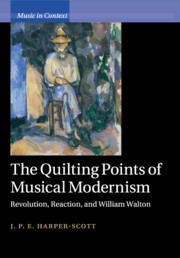The Quilting Points of Musical Modernism Revolution, Reaction, and William Walton Music in Context Series
Langue : Anglais
Auteur : Harper-Scott J. P. E.

A new theory of musical modernism, which brings contemporary philosophy into contact with music theory and interpretation.
Modernism is both a contested aesthetic category and a powerful political statement. Modernist music was condemned as degenerate by the Nazis and forcibly replaced by socialist realism under the Soviets. Sympathetic philosophers and critics have interpreted it as a vital intellectual defence against totalitarianism, yet some American critics consider it elitist, undemocratic and even unnatural. Drawing extensively on the philosophy of Heidegger and Badiou, The Quilting Points of Musical Modernism proposes a new dialectical theory of faithful, reactive and obscure subjective responses to musical modernism, which embraces all the music of Western modernity. This systematic definition of musical modernism introduces readers to theory by Badiou, Žižek and Agamben. Basing his analyses on the music of William Walton, Harper-Scott explores connections between the revolutionary politics of the nineteenth and twentieth centuries and responses to the event of modernism in order to challenge accepted narratives of music history in the twentieth century.
Preface; Part I. A Ruthless Criticism of Everything Existing: 1. Modernism as we know it, ideology, and the quilting point; Part II. Relationship Problems: 2. Modernism, love, and truth; 3. The love of Troilus and Cressida; Part III. The Revolutionary Kernel of Reactionary Music: 4. Communist modernism; 5. A new community; Afterword: what to do?
J. P. E. Harper-Scott is Reader in Musicology and Theory at Royal Holloway, University of London. He has published widely on Elgar, Wagner, Britten and symphonic music and opera of the late nineteenth and twentieth centuries and his books include Elgar Studies (edited with Julian Rushton), An Introduction to Music Studies (edited with Jim Samson) and Edward Elgar, Modernist. His work has strong intersections with continental philosophy and psychoanalysis (Heidegger, Badiou, Žižek and Lacan) and has increasingly come to espouse an explicitly Leftist perspective.
Date de parution : 01-2020
Ouvrage de 299 p.
16.9x24.5 cm
Date de parution : 08-2012
Ouvrage de 300 p.
18x25.3 cm
Thème de The Quilting Points of Musical Modernism :
© 2024 LAVOISIER S.A.S.



